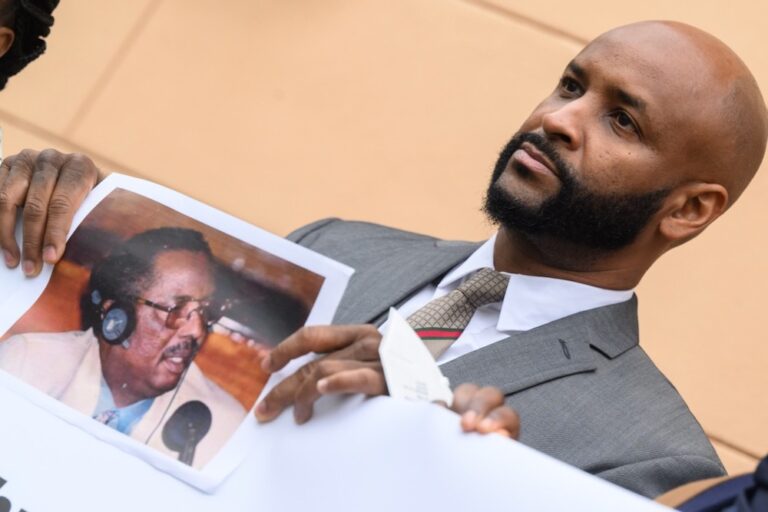(RSF/IFEX) – Reporters Without Borders has condemned the arrests of Sam Obi, the managing director of a new, privately-owned newspaper based in Banjul, the “Daily Express”, and one of his journalists, Abdul Gafari, who were held from 14 to 18 July 2006 at the headquarters of the National Intelligence Agency (NIA). The organisation also voiced […]
(RSF/IFEX) – Reporters Without Borders has condemned the arrests of Sam Obi, the managing director of a new, privately-owned newspaper based in Banjul, the “Daily Express”, and one of his journalists, Abdul Gafari, who were held from 14 to 18 July 2006 at the headquarters of the National Intelligence Agency (NIA).
The organisation also voiced concern about the disappearance of two other journalists who have may have gone into hiding. One is Ebrima Manneh of the pro-government “Daily Observer”. The other is Sulaymane Makato, former assistant editor of “The Independent”, a privately-owned biweekly that has been prevented from publishing since 28 March. Makato was briefly the “Daily Express”‘s acting editor earlier this month.
“President Yahya Jammeh’s police state is stepping up the pace of arrests and harassment in the run-up to elections scheduled for September, tightening the vice on the few representatives of an independent press,” Reporters Without Borders said. “We condemn these methods, as we have so often in the past, and we urge the international community to remind the government it should try to prove itself worthy of its position as the country that is the seat of the African Commission on Human and Peoples’ Rights.”
Obi and Gafari, both Nigerian citizens based in Banjul, were arrested during the night of 14 July and were taken to NIA headquarters. They were finally freed on bail on the evening of 18 July. Obi said he was not tortured and no charges were brought against them. Nonetheless, they were ordered to go back to NIA headquarters on 19 July with their newspaper’s registration certificate.
The Gambia correspondent of Radio France Internationale’s English-language service, Obi, brought out the “Daily Express”‘s first issue on 1 July, the day that the African Union summit began in Banjul.
Gambian Press Union president Madi Ceesay said the “Daily Express” upset the authorities by publishing a civil society coalition’s statement objecting to a ban on a free speech forum that should have taken place on 25-26 June, a few days before the AU summit. But officials attributed their arrests to an article suggesting that Ghanian President John Kufuor’s arrival in Banjul for the summit was stirring up discord within the local Ghanian community.
The pro-government “Daily Observer” published a letter on 5 July accusing the “Daily Express” of trying to “tarnish the image of this country,” which prompted Makato to resign as its acting editor. Makato said he received three anonymous SMS messages on 13 July warning that the NIA had him in its sights.
One, received at 6:24 p.m. (local time) said: “Good day Mr. editor your guys at Daily Express are with NIA beware of strange calls or invitations from even your colleagues becos they are after u to arrest u.” Another, received at 6:40 p.m., said: “Last warning get out before late.” There has been no news of Malako since 14 July. The NIA insists that it is not holding him. He may have gone into hiding.
Meanwhile, there has been no word from Manneh since 7 July. His family thinks he also may have gone into hiding to escape arrest by the NIA. Several organisations have accused the NIA of holding him, but this is denied by information minister Neneh Mcdoll-Gaye. Manneh’s brother, Lamin, said: “I went to the NIA, the police and the paper where he works. All of them denied knowledge of his whereabouts.”
Two other journalists are currently being detained or prosecuted by the Gambian authorities. Malick Mboob of the “Daily Observer” has been held since 26 May. Lamin Fatty of “The Independent”, who was freed on bail on 12 June, faces six months in prison on a charge of “publishing false news”. After several postponements, his trial is currently scheduled to begin on 27 July.


